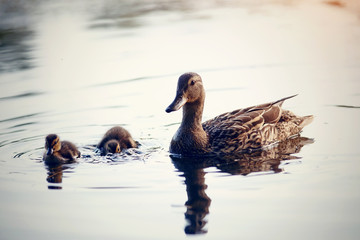We’ve taken to owning ducks like ducks to water! It’s cute cliche, but I also have some advice for new duck owners looking to improvise or DIY a watering situation or pool for them to swim in. Because let’s be real: ducks take to the water, and therefore, their water is everywhere!
It is important for ducks overall well being that they have access to water. Some say they don’t NEED access overnight, but we’ve found that it isn’t that hard to provide them with this small comfort.
WHY DUCKS NEED WATER ACCESS
While a large, custom made, expensive pond is not necessary to keep your ducks healthy and happy, they do need water. A kiddie pool or other tub in which they can submerge their bodies will work just fine. Ducks have an oil gland at the base of their tail that is activated as they splash water over their backs. This gland helps distribute waterproofing oils over their feathers as they preen their feathers, so providing them a place to bathe is critical. We used an old litter box (I washed it well first, but it doesn’t matter much because the ducklings pooped in it the second they climbed in) when the ducks were tiny. We got the baby ducks at the beginning of August when all the kiddie pools within a 150-mile radius were sold out. But we had the litter box from training our new cat to “go potty” outside several weeks before.
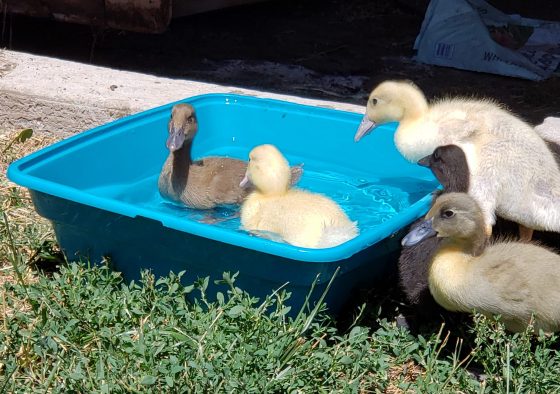
Now, the ducks don’t fit in the kitty litter box, so we (and by “we” I mean my husband) made them a pool, complete with a ramp to get in out of random extras he had in his shop. This cost us $0:
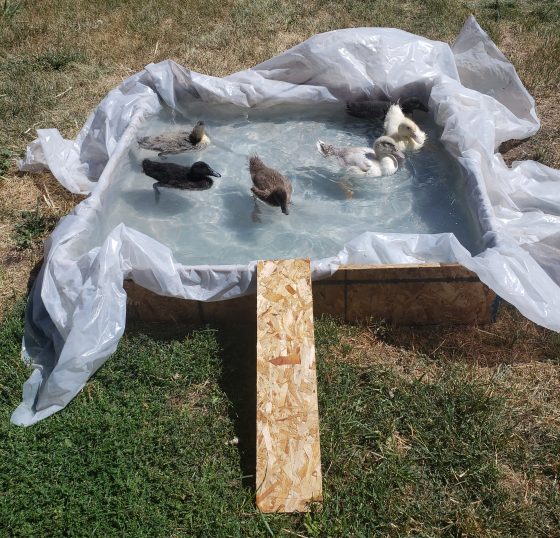
This pool is made from leftover plywood and plastic from random projects. I think the plastic is similar to the stuff you can for fairly cheap at the hardware store and used to protect surfaces from paint. It works just fine and as long as we double it up, it leaks minimally overnight.
NON-SWIMMING WATER
Beyond swimming, ducks should have access to water near their food and regardless of what system you come up with, the ducks will find a way to make muck. Ducks eat by grabbing a mouthful of food, or a mouthful of mud, bugs, and worms, and then dunking their bills into the water and swishing it around. Ducks need to get their entire head in the water. They use it to clean out their nostrils and eyes, so keeping ducks’ water crystal clear just isn’t possible. The important thing is that the water is refilled daily, kept free of fecal matter and algae by being cleaned regularly. Because the straw was getting overly wet with our waterer, my husband welded a “water catcher” to put underneath it to catch excess:
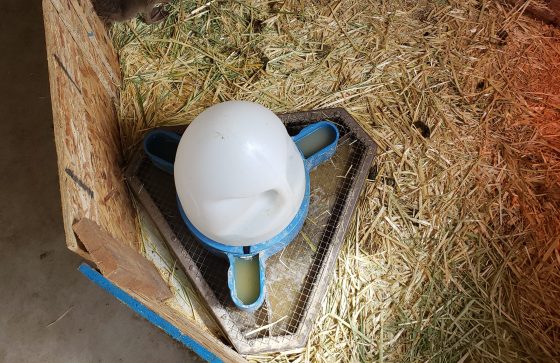
The “water catcher” still gets gunky and we have to spray it out once a week and I rinse off this waterer and refill it daily with fresh clean water. I give it a thorough, soap and water clean every two weeks or so because ducks are so messy and the gunk builds up. They still get a little bit of water on the straw around the water catcher, but it definitely helps keep the straw from getting soaked. The straw still has to be changed out once a day, but I have a few tips to make that easier too – besides a water catcher.
CLEANING TIPS
First, I suggest some rubber gloves and muck boots (rain boots will work, although won’t be warm enough in winter where we live.) Ducks like water. They make an astonishing mess with regardless of what you do and their poop is really wet. The gloves and muck boots are just right to keep your feet and hands dry and duck poop free as you clean. The straw or wood flakes (we prefer straw) should be changed out regularly, but always removed immediately if it is wet or if there is any whiff of an ammonia smell. I’ve found a daily removal of straw and replacement of clean straw works best for our ducks, but you’ll have to decide how often you change out yours. Once they are older and outside for most of the day, we may need to clean out the straw every other day, but we’ll see. When the ducks were young, I was only changing out the straw every two days. But that quickly increases with the size and frequency of their pooping, so just be aware of the added chore.
HELPFUL HINT: Compost the straw! Duck poop works wonders in your compost pile just like chicken poop!
Just put on the rubber gloves and scoop out the poopy and wet straw. We keep a wheelbarrow for the soiled straw right outside the duck house. When it’s full (it took about four weeks) I wheel it to the compost pile and dump it in. Then before I put the new straw in, I refill the food container and wash out their waterer. Once those are done. I use my bare hands to lay down the straw so you have more control and can create a more uniform layer. Over the winter, I plan to make the straw thicker just to give the ducks more comfort. This takes about 15 minutes, maybe less, and the ducks are outside swimming in their pool, and not in my way while I clean up. When they get older, this will be the time you’d want to collect their eggs.
There are also ways to make the mess less icky and clean up of the duck house much faster. Regardless of what’s done, they like water and giving them a pool to swim in will make them happy, but it’ll also mean some wet messes for you. I’m willing to clean up after our six ducks because I have grown to love them like my kids do and think of them more like pets than “egg makers.” Which, ironically, makes them better at both (at least in my own mind). But that doesn’t mean providing water and a pool has to be an expensive or time exhaustive effort. Just get creative and use what you’ve got! You’ll get bonus points for your sustainability too!
Helpful articles on caring for ducks
Homesteading: Ducks vs. Chickens & How We Chose
How to Prepare Your Flock of Ducks For Winter
Duck Eggs vs. Chicken Eggs: What You Need to Know
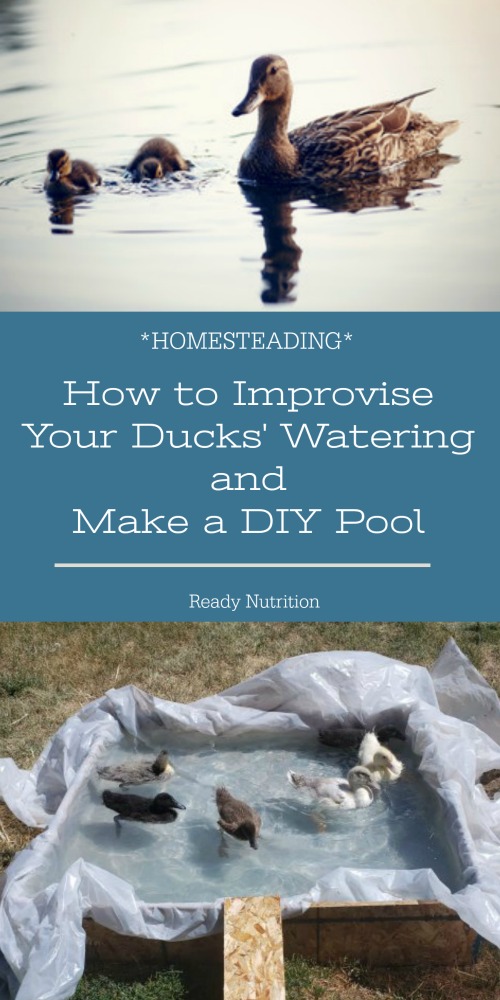
This article was originally published at Ready Nutrition™ on October 20th, 2019


